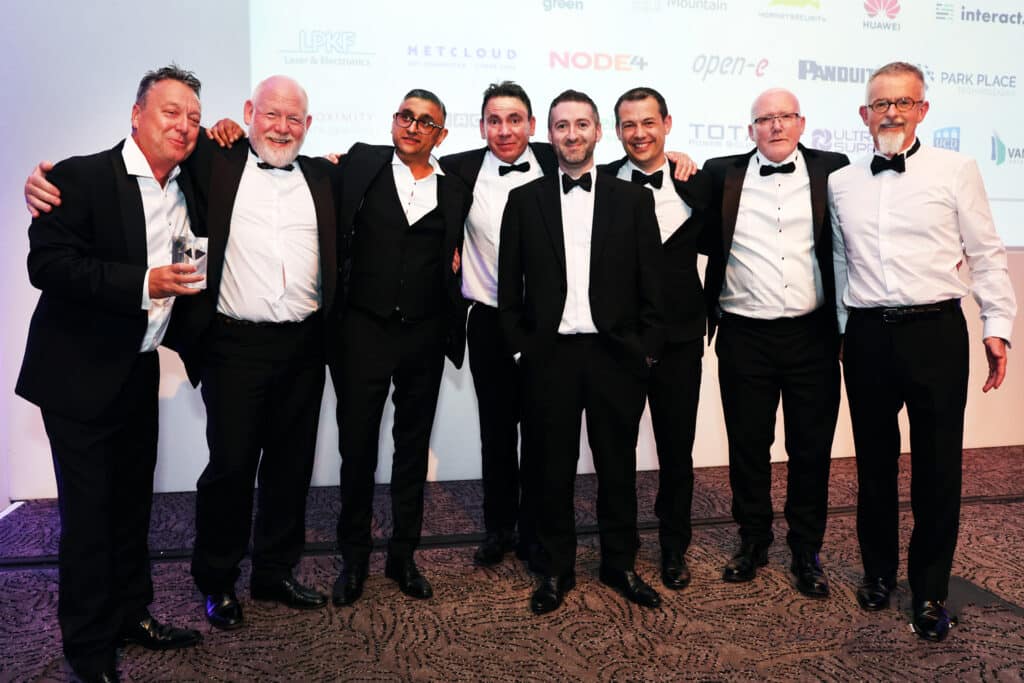Proximity are winners at the 2003 DCS Awards.

This year’s DCS Awards saw Proximity Data Centres nominated in two categories. Attending on the night John Hall was honored to accept the winning award for Edge Innovation of the Year. A project based around meeting requirements for Edge-based immersive VR and AR experiences for the company Grid Factory.
Proximity was also announced as runners up for the Edge Project of the Year. This was for their strategy roll out of regional Internet Exchanges across the network of their data centres.
Winners – Edge Innovation of the Year
Case study: The GRID Factory
Introduction
In May 2022, Proximity Data Centres completed an advanced implementation of a sophisticated edge computing platform at its Edge 7 data centre in Swindon. This was for The GRID Factory. The 25kW high density racks, supported by a highly efficient climate control, use a three-stage cooling system to ensure IT equipment performs efficiently.
Description of Application
The GRID Factory is an Immersive Technology Integrator and Cloud Services Provider who specialise in NVIDIA technologies such as CloudXR, vGPU, Omniverse and EGX Server. Their client required a new approach for delivering highly accurate 3D city models which enable designers, architects, and engineers to work from a variety of remote locations, enabling a building to be conceived, co-designed, engineered and deployed as a 3D model both off and on site. The 3D city models starting initially in London, Birmingham, Bristol, Cardiff, Detroit and Dublin have been added to the portfolio, with more available on request.
Powered by NVIDIA RTX data centre technology, the application allows high levels of collaboration through the design, approval and build phases and so reduces the associated costs to the client. It allows key stakeholders to quickly visualise and understand any changes and to measure progress without physically being together.
The GRID Factory platform uses a combination of high performance, low latency, Edge networking provided by their partner BT, which connects customers to NVIDIA RTX 8000 and NVIDIA A40 datacentre GPUs to allow highly performant, real time, 3D, and immersive experiences.
Key Requirements & Challenges
The GRID Factory platform requires high levels of power (25kW) in a single rack as well as cooling in a secure environment. Power requirements of this level are still very rare in the data centre market and are challenging to deliver cost effectively.
Due to the design of the Proximity Edge 7 data centre, Proximity was able to create an extremely comprehensive package that not only allows support for these new 3D and immersive workloads to be delivered but will also support resource intensive computational workloads such as Blockchain, AI and ML on The GRID Factory platform.
Lastly, The GRID Factory required an edge data centre partner who could support the deployment of multiple platforms across the UK to ensure a best-in-class service, minimising latency and reducing network costs.
The Solution
Commencing in February 2022 Proximity and The GRID Factory worked closely to understand the unique requirements for the computing platform and to develop the solution.
In April 2022 Proximity’s Edge 7, 89,000 sq ft edge data centre in Swindon was chosen as the initial deployment site for the application. Along with significant power, the facility offers easy access to digital fibre routes connecting London to Ireland and the USA. It is also highly accessible to the major R&D hub at Harwell which is home to numerous research organisations in biotech, genome, and space-tech.
The site uses a modular and flexible blade room design to support The GRID Factory platform which will allow the platform to grow as well as ensuring continuity of power and high levels of cooling.
The cooling unit uses primarily fresh air cooling for external temperatures up to 24 degrees centigrade, with secondary evaporative cooling controlling temperatures up to 34 degrees centigrade. However, the system has been tested up to 48 degrees centigrade. Direct Expansion (DX) refrigerant cooling provides final backup for temperatures exceeding 34 degrees centigrade. DX cooling is also used during full re-circulation mode should the outside air become contaminated, or to contain the fire-extinguishing gas system in the event of an internal fire.
The GRID Factory technology stack uses specially designed cold aisle technology which is sealed and pressurised with blanking panels to stop cool air loss. Thermal imaging is used to check for leakage from the hot aisle. A key factor was not only the ability to support a 25kW rack today but be able to increase to 50kW in the future.
In addition, the availability of diverse high-capacity fibre connectivity was a key consideration to minimise latency. This was achieved through Proximity Edge 7 and BT.
Further benefits:
To support the required future deployment of multiple platforms, Proximity Data Centres has 10 edge facilities in the UK on stream and has identified another 10 sites to acquire in the next 12 months. Proximity’s policy of full on-site support, transition and onboarding and provision, along with server migration services and a straightforward contract with a single set of SLAs covering one or multiple sites was also a key factor in the decision to partner.
Ben Jones, founder and CTO of The GRID Factory commented:
“GRID Factory have delivered a variety of Virtual and Augmented Reality experiences for partners and clients including NVIDIA, Autodesk, Cavrnus, BT, EE, Vodafone, Coventry University, Ericsson, Hyperbat and DivisionX.
“As an Immersive Technology Integrator and Cloud Services Provider who specialise in NVIDIA technologies such as CloudXR, vGPU, Omniverse and EGX Server, we make major demands on data centre power, connectivity, and engineering support. Proximity has ticked all the boxes in this respect when it comes to power availability, scalability, low latency, and onsite support.”
Runners up – Edge Project of the Year
Case study: Regional Internet Exchange roll out strategy.
Proximity Data Centres, the UK’s fastest growing edge colocation data centre provider announced in January plans for the roll out of a network of regional internet exchanges across the UK and Europe.
This initiative is the first of its kind and is in line with Proximity’s ongoing commitment to reducing latency by bringing data and services physically closer to the end users, devices and customers that need them.
From Q1 2023 the company’s newly formed Edge IX division will commence a phased build out of internet exchanges which will be based at each of Proximity’s regional colocation data centres. Currently there are 10 such facilities strategically located to conurbations and cities in the North, North West, Midlands, Thames Valley, South West and South Wales. Further data centres equipped with exchanges will be added to the portfolio during 2023 as the company continues to expand to be within reach of 95% of the UK population.
“Solving latency and data transit challenges are high priorities for Proximity and our growing portfolio of customers, especially those developing virtual reality, gaming and IoT services,”
said John Hall, Managing Director-Colocation, Proximity Data Centres.
“The wider availability of regional internet exchanges will enable the lowest latency possible for demanding edge computing applications and services including those for gaming, healthcare, manufacturing and smart cities, while also offering a more efficient and cost-effective solution for the backhauling of rapidly growing data volumes.”
He added: “Internet exchanges in the UK have been successful in supporting the development of the digital economy but the increasing demands of low latency bandwidth-hungry applications requires a new approach, complementing the existing infrastructure model. The proliferation of edge data centres and internet exchanges will play a vital role in regional economic development. The availability of these resources at a local level will support digital businesses, regional tech hubs and bring significant economic growth to the regions. These will in turn bring new opportunities to the benefit of local communities.”
